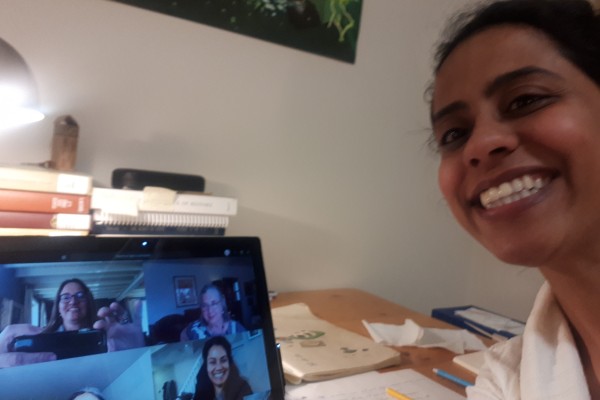A team effort for dissertation defence
A student in the Department of History was one of the first ever at Queen's to defend her dissertation remotely.

Sanober Umar after successfully defending her dissertation over a video conference on Microsoft Teams.
Queen’s has had graduate degree programs since 1889, but is still having new firsts in its approach to graduate education. Over the past few weeks, the university has held its first remote defences of theses and dissertations. One of these defences was for Sanober Umar, who on April 6 became the first PhD candidate in the Queen’s Department of History to defend her dissertation using Microsoft Teams.
Nine people joined the video conference, including Umar, her committee members, a facilitator, and a staff member from IT Services for support. Most were in Kingston, but one person joined from New York City and another from Halifax.
"Even though it was a momentous occasion, I felt surprisingly calm going into my defence. Mainly because I received so much support from Barrington Walker and Saadia Toor, my supervisors; Adnan Hussain, Graduate Chair in the Department of History; and Betsy Donald, Associate Dean in the School of Graduate Studies. Because of their help, I was able to focus on preparing and didn't have to worry about whether the new situation would affect my defence," says Umar. "The advisors at the Ban Righ Centre, who have provided me with so much support throughout my time at Queen's, also helped to keep me calm in the days before the exam."
A successful remote defence
Shortly after learning that classes were transitioning to remote delivery, Umar says she was contacted by Hussain, who let her and the other graduate students in the department know that there were plans in the works for holding defences and exams remotely. The School of Graduate Studies (SGS) also reached out with the same message. “I never had to worry if my defence or degree would be delayed,” Umar says.
Making sure no technical glitches got in the way, David Smith, a staff member in IT Services at Queen’s, stayed on the video call for the duration. All the committee members were also eager to make sure that the defence could focus on Umar’s dissertation rather than whether everyone’s technology was working properly. So they all agreed to join the virtual meeting half an hour early to sort out any potential issues.
Typically, successful defences end with a celebration of the accomplishments of the student. While there could be no in-person gathering, the facilitator of the defence did bring out balloons and a congratulations sign to recognize Umar’s achievement. As her dissertation studies global Islamophobia in the second half of the twentieth century, Umar appreciated having this light-hearted note after discussing such a serious topic for three hours.
Best practices for remote thesis examinations
As Queen’s continues to practice physical distancing, it will rely on this remote format for administering graduate exams and defences. And SGS is providing support and guidance for all students and departments. It has put together a guide to best practices for remote exams which were followed during Umar’s defence, helping to ensure it went off without a hitch.
“Queen’s is one of the first schools in Canada to compile best practices for remote thesis examinations. And we have already seen many departments put them to use as they hold their first-ever remote defences,” says Betsy Donald, Associate Dean, School of Graduate Studies. “I served as the facilitator for Umar’s defence, and it was a pleasure to see her thrive in the remote setting.”
To read the SGS best practices guide for remote thesis examinations, see their website.
Note: This article originally appeared in the Queen's Gazette.

